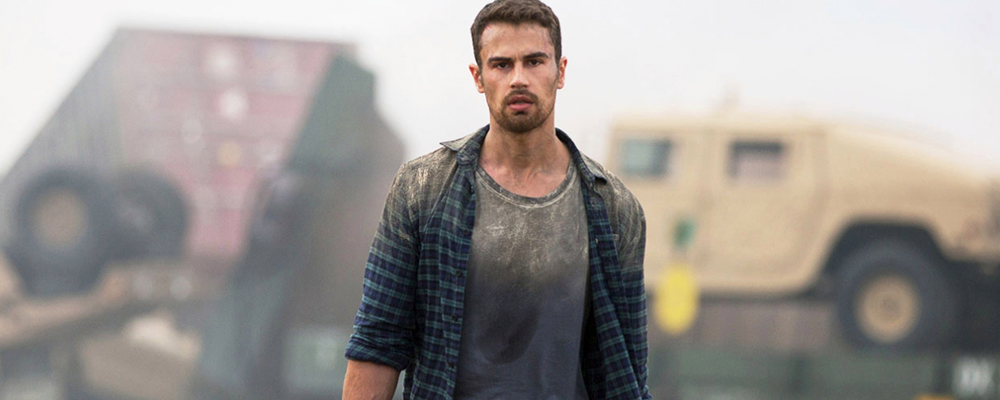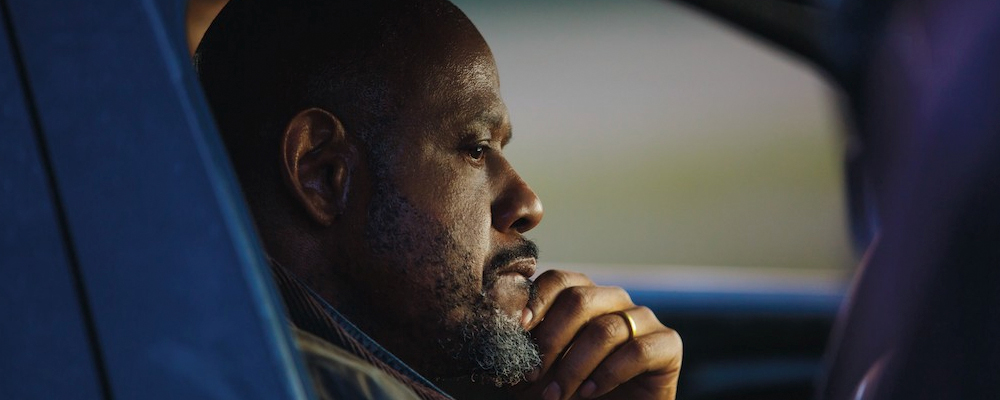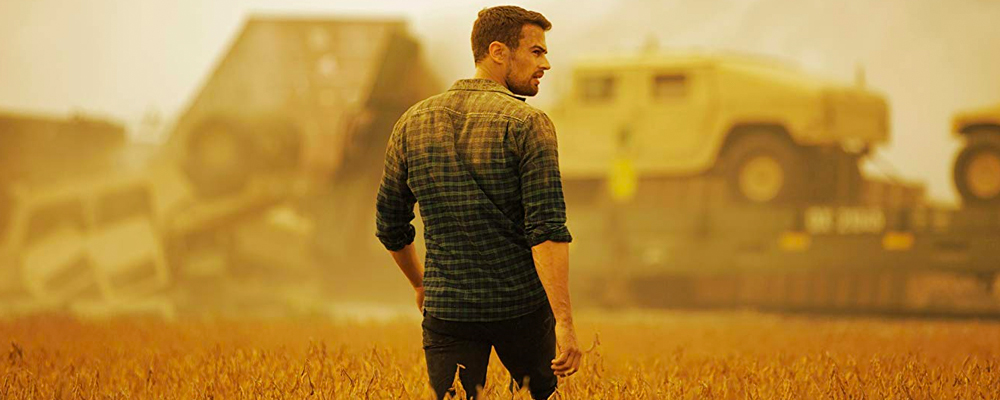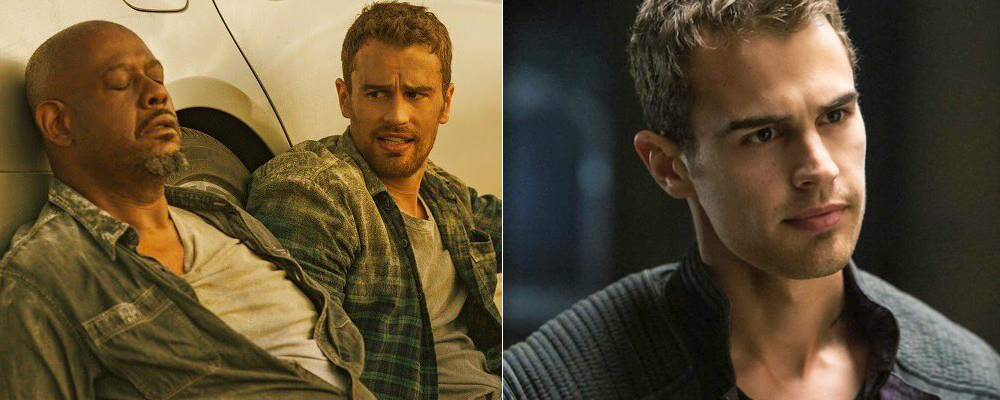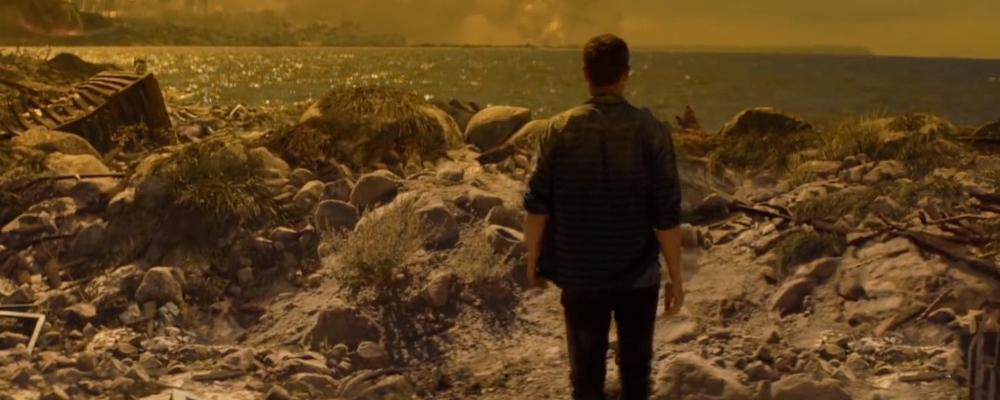Theo James and Forest Whitaker Fight the Apocalypse in Netflix’s ‘How It Ends’
Michael Amundsen
“How It Ends“ is director David M. Rosenthal’s perilous road trip into the heart of the apocalypse. Theo James plays Will, a man in love and desperate for the approval from his girlfriend’s hard ass, ex-military father, Tom (Forest Whitaker), that he travels from Seattle to Chicago to make the appeal personal. He fails. He loses his temper. Unlikely father-in-law digs in. It doesn’t look good for any future marital bliss. Head between his legs, Will retreats to the airport to fly home.
Is there any hope for these lovers? Actually, yes. It comes in the form of an apocalyptic disaster destroying the West Coast. With his daughter in the path of certain death and destruction, daddy Tom hits the road, dragging his daughter’s beloved along. It’s a road trip through murderous vigilantes and thugs, ferocious storms, and failing gas supplies. But the only thing that will keep them from their destination is each other.
Recently, Entertainment Voice sat down with director David M. Rosenthal to get his take on shooting in Winnipeg, forgoing green screen in favor of physical effects and working with the legendary Forest Whitaker.
“What drew me to the story was watching these two people try to figure each other out. Watching this relationship in one of the worst situations you can imagine as a backdrop. We don’t fetishize the apocalypse. The event stays a mystery for so long.”
“One of the things I adored about the script (written by Brooks McLaren) is we still don’t know by the end of the movie. The point is that relationship between that father and his son-in-law and how their desires align to save the daughter. When I read the page where the father finally opens up to Will, I thought if I can just get this. It’s the whole story.”
Having the right actors playing those roles was crucial to the success of those emotions. The character of Will demanded someone who could cross the line between regular urbanized white collar worker to someone who was capable of embracing violence when he had to. It’s a big stretch but Theo James pulls it off.
“He was perfect in so many ways. I heard that he was in this play (in London) and I had read some of the reviews. I wanted to look him in the eyeballs and talk to him about this movie. He’s a cinephile. And I was totally impressed by his ability and his intellect.”
At the same time, the character of Tom has to follow a somewhat reverse trajectory. As the abrupt and stern father-in-law, the actor has to pull off Tom’s eventual warming to Will. With a storied career, Oscar-winner Forest Whitaker is almost legendary in his range. In this movie, he plays the father-in-law with such intensity that he is scarier at times than the natural and unnatural disasters happening all around them.
“I have been a Forest fan forever, probably since “Fast Times at Ridgemont High. I have gotten to work with some amazing actors, but I was nervous about even meeting Forest because he is such a force. But he is such a kind, considerate, and thoughtful man. Very soft spoken. And when he does a character, he goes very deep.”
“A friend of mine had worked with him before and he warned me that he won’t break out of character and joke around with you. He will stay in character and in the moment. He can create a very intense atmosphere, but I hope to get the chance to work with him again because he is so fantastic.”
In the production design, Rosenthal shows enough details in the changing landscapes that the audience can feel how long and arduous the journey is. The landscape, while beautiful, is shot in a way that suggests a sense of foreboding and underlying menace.
“Just before starting production, I started a reverse road trip, going from Seattle to Chicago. I took my time and I took a lot of pictures. The landscape of Winnipeg is very analogous to that part of the Dakotas. And then we went to the Canadian Rockies outside of Calgary, which are beautiful, to approximate that landscape in western Montana.”
Rosenthal came into production with very specific guidelines that would make the production even harder.
“To shoot an apocalypse movie in 40 days, I insisted, maybe stupidly, on shooting all the car stuff actually on the road and not doing anything green screen – no staged stuff, no process trailers, no pulling cars around. We had built this van, this big bus, where we had all this wireless equipment and had monitors inside and sound guys and lighting guys doing wireless lighting.”
“And then we built this top rider onto the dad’s Cadillac and put a stunt rider on top of the car driving the car. We were able to get this incredible footage.”
So much is shot these days utilizing visual effects that we have become jaded by a technique that can show us anything the mind creates. Rosenthal’s approach kept the action firmly planted on earth. Everything looks real because it is real. One feels they are watching something that could actually. The stunts are real, the crashes are real and thus the danger feels more real.
Though shot in Canada, the crew on “How It Ends” was international. Rosenthal found that creative people from other nationalities and countries could bring a different perspective to his film, like his Finnish Cameraman Peter Flinckenberg.
“I think it’s something special when someone who is not of this country can look at this country and do it in a slightly different way.”
“Film is now very international. People work everywhere. My production designer Philip Ivey, who’s terrific, who’s from New Zealand, went to do “District 9” in South Africa and then to Canada to do our film and then to Morocco for another movie. Now he’s in India doing yet another movie. That’s one of the different and enjoyable parts of our business.”
As physically challenging as “How It Ends” proved to be, Rosenthal did not lose focus on what truly made the movie work. With emotionally charged performances from both Whitaker and James, the story never detours until the end from what counts, the determination of two diametrically opposed strong-willed individuals to protect the person they both love. In fact, it can be said that at the conclusion of the film, which happens without Whitaker, the story loses its energy and seems tagged on.
“I love these movies — apocalyptic thrillers. I love “Children of Men.” But for me it was that relationship (between father and son-in-law) that was the most magnetic and drew me the most.”
“How It Ends” begins streaming July 13 on Netflix.

